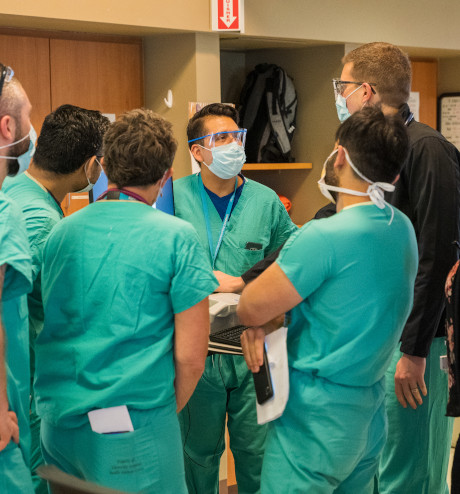You've read these neurology mantras a million times: Time is brain. Act FAST to save stroke patients' lives. For neurology residents, the impact of these quips may not fully hit home until you see it with your own eyes.
At UNM Health Sciences Center's Neurosciences Intensive Care Unit, neurology residents experience this light bulb moment every day—and I get the joy of witnessing that "I know what I want to do with my life" revelation.
Neurology residents at UNM HSC train in New Mexico's only Level 1 Trauma Center and only Comprehensive Stroke Center. We see 7,000 patients annually, with conditions that range from acute neurotrauma to life-threatening strokes and traumatic brain injuries.
We receive patients in devastating neurological states, often with multiple, complex underlying conditions. And when we can intervene quickly, as a team, we can drastically—positively—steer the trajectory of a patient's cognitive and physical health.
These moments are lifechanging for patients and our neurology residents. It's in these critical situations that residents discover their love for the subspecialty of neurocritical care.
What to Expect as a Neurocritical Care Resident
Neurointensivists train in a unique framework of skills. Essentially, we become a patient's subspecialist, emergency medicine physician and (temporary) primary care provider, all in a matter of minutes.
We combine specialization in emergency brain care with expertise in overall complex care—managing underlying conditions such as diabetes and high blood pressure, which affect the brain's ability to heal.
As a resident, you'll experience all kinds of exciting ICU duties. But not every moment is a rollercoaster. Delivering the highest level of neurocritical care is dependent on administrative tasks, observation and balancing compassion with authority in patient and family interactions.
I've done this work for 20 years, and no two days have ever been the same. Generally, people who choose this field love the unpredictability and are enamored with the brain, providing complex care and chasing the next adrenaline rush.
Here's a glimpse at what an average resident shift might entail in the Neurocritical ICU– a place where one must always expect the unexpected.
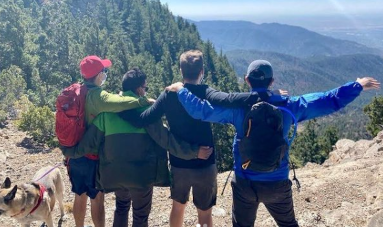
Virtual Campus Experience
Explore the UNM Department of Neurology's Virtual Campus Experience and what being a Neurology resident at UNM means.
12 Hours in the Life of a Neuro ICU Resident

0400:
Rise and shine!
Time to start the day. Exercise, coffee, shower—get your morning routine down pat to provide some structure in an otherwise unwieldy day.
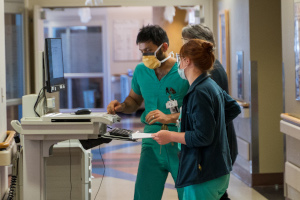
0530 - 0700:
Start Your Shift
You'll start the day by taking reports from the night shift residents. Then you will see your patients—double-check labs and study up on their unique needs and current status. You'll also check in with the night-shift nurses and help fill any gaps of information the day-shift nurses will need—they'll arrive around 0645.
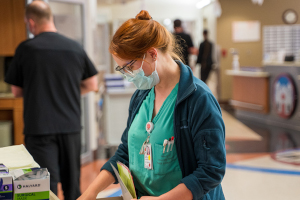
0700 - 0800:
Your "Ready, Set" Moment
This is your time to prep before rounds. Collect your lab information, write your notes and gather any paperwork you need for rounding. Then, it's Go Time.
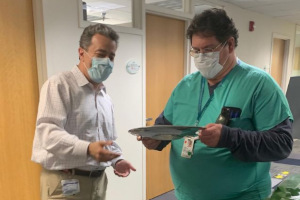
0800 - 1200:
Rounding
We conduct ICU rounds as a caravan. The procession usually includes you and the attending, other residents, fellows and physicians, nurse practitioners, a respiratory therapist and a nutritionist. With several computers on carts in tow, the caravan will make its way up and down the corridors, stopping at each patient's room.
When we visit your patients, you'll present on their status, complications and care plan. Together, we'll go through the plan systematically. You'll tell us what you think we should do next. A procedure? Medication? Therapy?
The group will confer and agree or disagree with the plan. We'll do research on the spot to support our decisions. Sometimes we can discuss next steps with the family right away. When we need further internal discussion, we let the family know we'll visit again in the afternoon.
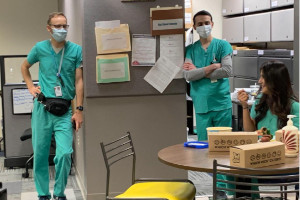
1200 - 1300
Grab a Bite to Eat
You'll need energy for the busy afternoon ahead!

1300 - 1500
Procedures
UNM HSC residents conduct many procedures under faculty guidance, such as bronchoscopy, arterial lines, central lines for blood pressure monitoring and temperature lines for whole-body cooling. During this time, you'll assist with or observe scheduled and emergency procedures, such as TPA administration.

1500 - 1630
Family Meetings
Sometimes, family meetings are joyous occasions—like when we can report that a patient is making significant progress. However, sometimes we must deliver unpleasant news and initiate end-of-life discussions. Learning how to deliver devastating news to families with empathy, and in a clear and understandable way, is part of the training in the Neuro ICU.
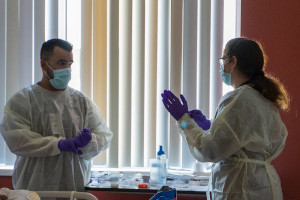
1630 - 1730
The Last-Hour Scramble
In this hectic 60 minutes, you'll squeeze in some education with faculty and discuss questions and best practices that came up throughout the day.
The rounding caravan will meet again to make sure we've retrieved all the data we needed to collect and that any issues that arose have been resolved. The last step in the day is to debrief the night-shift team, who will pick up where day shift left off. Then, it's time to head home, get some sleep and prepare for another day of patient care.
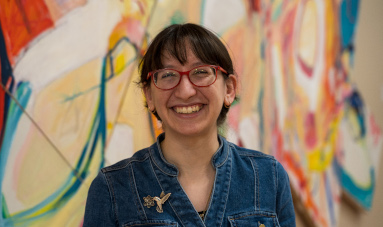
Meet the Residents
Watch current residents talk about their UNM HSC Neurology experiences.
4 Pointers About Your UNM Neuro ICU Residency
1. Your Working Hours Are Capped
Residents and fellows at UNM HSC are capped at 80 hours a week. You will be required to take off two days a week, which may or may not be in a row. This is for your personal health and safety, and for your patients' health and safety.
2. It's a 4-week Gig
You'll rotate four weeks in the Neuro ICU each year of your Neurology residency, through the third year. During your fourth year, you can do an elective in your area of interest.
Those four intense weeks will show you right away whether the ICU is where you belong, or whether it's absolutely not for you. It's beautiful seeing residents who love neurointensive care become more confident, knowledgeable and passionate, year over year.
3. The Neuro ICU is Shift-based
Your residency, fellowship and neurocritical care career will run on shifts. The ICU receives patients 24/7. Hospitals and academic medical centers rely on shift scheduling—and passionate, dedicated providers—to handle complex patient needs.
UNM HSC schedules neurocritical care doctors one week on, one week off. Generally, we have one nonstop week in the ICU, then at least week off to recuperate depending on what the other responsibilities of the faculty are (i.e., administrative or education roles). The upside of shift work is knowing exactly when you will and won't be on the clock (usually!). The downside is that you don't always have your own set of patients that you follow, per se.
4. You Will Forge Lasting Patient Relationships
Patients and families in the ICU are in a heightened emotional state. The compassion and skill you provide can change people's lives, which creates lasting bonds. Many of our patients and families send us holiday cards each year. We keep and treasure them—their words are a daily reminder of why we love this grueling, but incredibly rewarding, career.
A Few Closing Thoughts
Some neurology residents dream of conducting deep research, probing and solving questions about disease etiology. Others dream of direct patient care for individuals with Alzheimer's and other devastating brain diseases. All these areas of study are important and exciting in their own ways, for the right people.
Future neurocritical care doctors fit outside those boxes. These residents dream of intervening in emergency situations, bringing calm to chaos and investigating the complexities of whole-patient health to save the brain and heal the body.
If that sounds like you, consider pursuing neurocritical care as your subspecialty. It's a neurology niche that combines your passion for patient care with your quest for that next adrenaline rush.
Curious about our Neurocritical Care Program?
Schedule a call with JJ Maloney, Medical Education Program Manager for the UNM HSC Department of Neurology.

